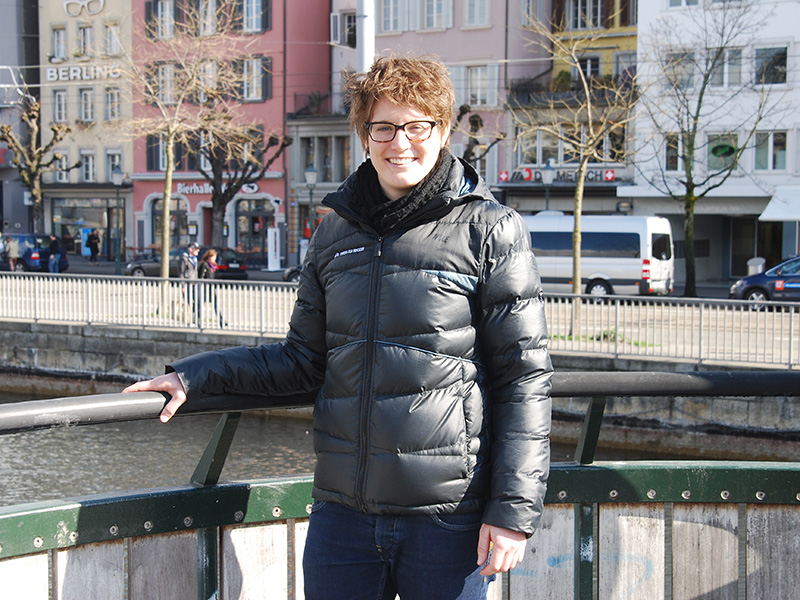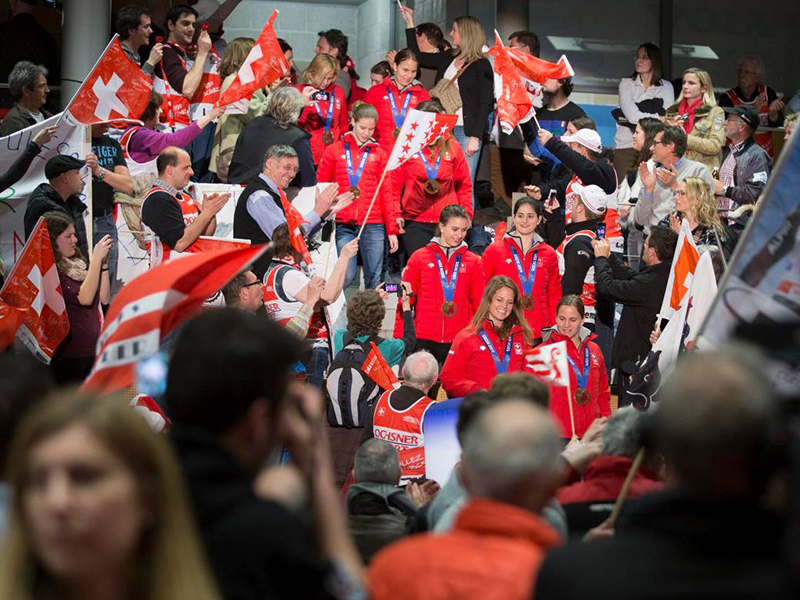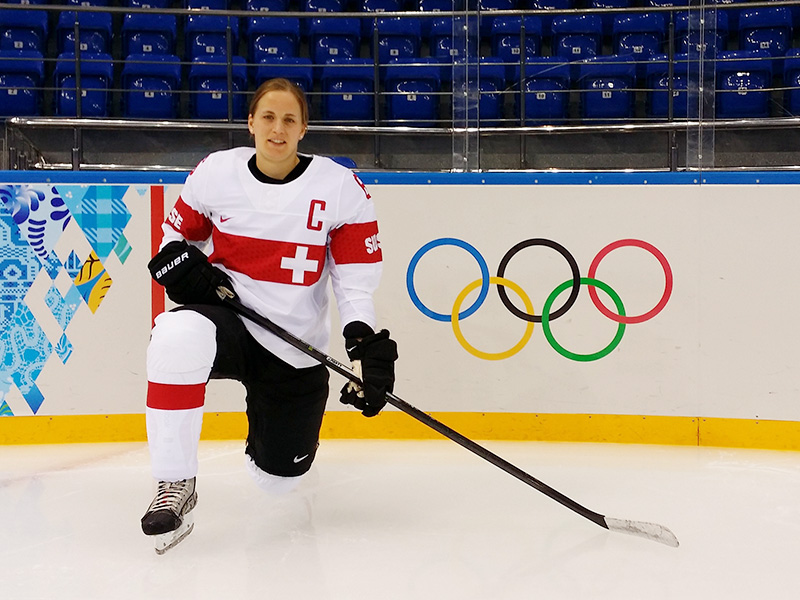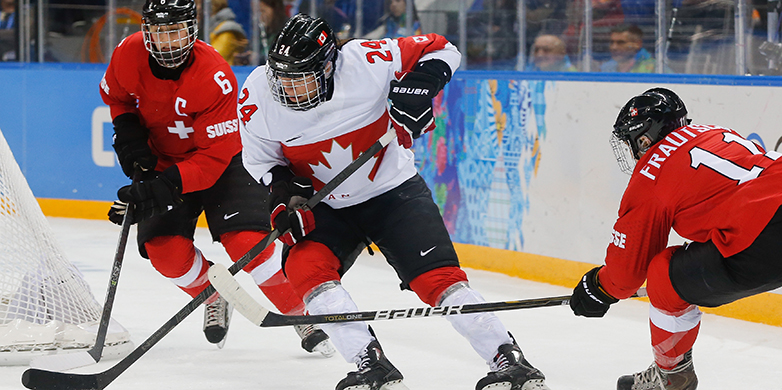Commuting between the ice arena and lecture hall
The hockey women's bronze medal in Sochi moved Switzerland. The fact that the players' achievement is based on hard work is demonstrated by ETH students Angela Frautschi and Julia Marty.
It was a difficult start back into the daily routine. A couple of evenings previously, Angela Frautschi and Julia Marty had beaten the Swedes after an exciting come-back performance at the Olympic Games in the match for the bronze medal together with the rest of the Swiss women's team. "We could hardly believe it," remembers Frautschi. Suddenly the amateur sportswomen were the focus. Reporters were holding microphones in front of their faces, cameras were filming them and flashes were being fired every half a second.
Back in Switzerland, Sochi and the big victory are a remote memory again. That is something she has to get used to, says Marty. For a month she had 30 players around here who were jointly pursuing one goal: the medal. "The switch from the world of the Olympics to normal life was difficult," says the 25-year-old. Marty is playing in Sweden. The playoffs are now scheduled. Then she will be returning to Switzerland. Back to ETH. After her master in movement sciences and sport, she is graduating as a teacher there.
Angela Frautschi has swapped her skates for sneakers and a rucksack. Since the autumn, she has been studying movement sciences and sport at the Department of Health Sciences and Technology (HEST). Just the thing after the excitement of recent weeks, says the 26-year-old. Turin, Vancouver, Sochi – she has played for the Swiss national team at the Olympic Games three times. Frautschi has no time for melancholy. During the day she takes notes in lectures or revises the subject at home in Bülach.
In the evening she then puts on her skates for her training sessions.In the hours in-between, she works out in the gym of the ASVZ. It is not always easy to find the time for all her commitments. The first semester was hard, in particular as the preparation for the Olympics was demanding. She was forced to quit her part-time job as a sports goods sales assistant and she cannot live off professional sport. Ice hockey is still a only a hobby for women in Switzerland, not a profession.
The bronze medal may be a wrong sign
Many hockey players on the national team work 80 to 100 per cent on top of their sport. This is not a topic for the men. They are pros. Julia Marty is not calling for women to also be able to rely fully on hockey in the future. Her demand is more modest: "I hope that female hockey gains in prestige on the back of the success of women's national team. Now we have shown that we play at the top." She would like to see more professional players in Swiss women's hockey. Specifically? Girls in the grassroots teams of all Swiss clubs should be promoted equally as their male team mates and well-educated coaches and better training times should be provided for women's teams.
Women hockey players are often only allowed on the ice after the men, i.e. from 9.00 pm. Angela Frautschi takes a similar view: "We should be able to play as semi-pros." She does not want to become a fully blown professional. She likes her course in movement sciences too much for that. Contrary to Marty, she doubts that the Sochi win will improve the standing of women's hockey: "The bronze medal may be a wrong sign. People will think women manage without support."
What is behind the women's careers in sport? Already at the age of eight, Julia Marty was on the ice with her skates and stick. Her life has been guided by the sport ever since. For instance, she studied in the US thanks to a sports grant together with her twin sister, who also plays on the Swiss national team. "Those were dream conditions for me," remembers the Wettingen-based player. On the university campus in Boston, she would commute every day between ice arena, gym and lecture hall. "I could train whenever and as often as I liked." Things are different in Switzerland. She needs to "arduously assemble" her four ice hockey training sessions per week here, she says.
Getting to the very top from the very bottom
The two women spend nearly every spare minute on the ice for seven months a year. There is hardly any time for their families and friends, says Angela Frautschi. She has physically experienced what that means. A year ago, the cyclist had an accident on the ice. The consequence was that she sustained a severe head injury. This was a low point for the sportswoman. "I was not even able to ride my bike. That was depressing." But she is not one to quit. The sportswoman fought, slowly but surely. Last summer she got back on her bike and exercised. At first, she still had to tackle headaches. She struggled through and proved her will to everyone. "Many didn't expect me to ever play again."
After the bronze medal, she is now finally thinking of slowing down a bit. Most players end their careers at the age of 30. It is not sure whether she will play for another four years. But saying good-bye to the ice is difficult, as the young lady says: "When you've experienced something as emotional as ice hockey, you cannot simply stop. You want to keep feeling this sensation."
Photo Gallery
-

Angela Frautschi does not want to become a fully blown professional. She likes her studies at ETH Zurich too much for that. (Photo: Angela Frautschi) -

The women's national hockey team was welcomed by about 500 enthusiastic fans in Kloten on their return home. (Photo: Swiss Ice Hockey) -

She will have to get used to the calm after the storm in Sochi, says Julia Marty, and now focus on her teaching diploma for sport. (Photo: Julia Marty)

